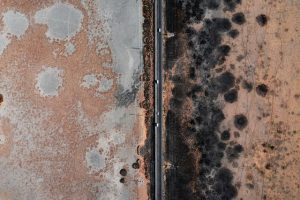Can I Live With Mold in The House?
 Mold is a type of fungi that grows in dark and moist areas. Some people think that this problem is harmless and continue to live in a house faced with mold issues. However, this could not be further from the truth.
Mold is a type of fungi that grows in dark and moist areas. Some people think that this problem is harmless and continue to live in a house faced with mold issues. However, this could not be further from the truth.
Mold is extremely dangerous and is known for how fast it spreads. It can grow on various surfaces, including wood, glass, paper, plastic, fabric, and can occur both indoors and outdoors.
Mold spores spread via air and are more than just a cosmetic problem. Not only does it damage your property, but it also causes major health problems for human beings. If ignored, spots of mold can continue to spread and develop into large colonies. Thus, mold remediation specialists should be called at the first sign of mold so your property can be cleaned as soon as possible.
Structural Damage
As long as conditions are damp and dark, mold can continue to thrive. As mold develops, it starts to eat away at material including drywall, carpets, wood, and more. This can cause structural issues and compromise the structural integrity of your house. Warning signs include discoloration of walls and ceilings, damaged hardwood floors, a musty odor, and condensation on the walls and windows.
Even if mold is not visible, it can damage the structural integrity of the property. Mold remediation services like 911 Restoration should be called upon as soon as possible. This will not only save the structure, but also prevent further damage and added expenses.
Allergic Symptoms
One of the first signs of mold being present in your house is an increase in allergy-like symptoms. Like other allergies, mold allergies produce symptoms like sneezing, runny nose, itchy nose and throat, and watery eyes. The airborne particles released by mold affect the upper respiratory tract and thus, can cause those with asthma to have asthma attacks. The following are some of the symptoms you’re likely to see if you have a mold allergy and are exposed to this fungus:
- Sneezing
- Watery eyes
- Itchy nose
- Dry, scaly skin
- Cough
- Itchy throat
- Runny nose
- Stuffy nose
- Itchy eyes
Since these symptoms vary from person to person, no two people will have the exact same symptoms. You may also already have existing allergies. However, you may notice that your allergies are worse at home than when you’re outside. If you suspect a mold colony in your house, you cannot live there. It’s best to call in a specialist service as soon as possible.
Aspergillosis
Different types of mold can cause serious health problems. One such type of mold is Aspergillus, which can cause aspergillosis in individuals who suffer from a weakened immune system or lung disease. There are four different types of aspergilloses:
Allergic bronchopulmonary aspergillosis (ABPA)
This kind of aspergillosis affects the lungs and causes breathing problems in individuals.
Chronic pulmonary aspergillosis
In addition to breathing problems, those who suffer from this condition also exude other symptoms like a cough and weight loss.
Aspergilloma
Also known as fungus ball, this type of aspergillosis can cause breathing problems and a cough that can produce blood.
Allergic aspergillus sinusitis
This can cause headaches and primarily affects the nose.
Breathing Problems
Mold growth results in unstable organic compounds like spores entering the air. They can produce irritants, allergens and mycotoxins. These can cause breathing problems and can be toxic, especially to those sensitive to them, such as those suffering from chronic lung conditions or illnesses like asthma. Furthermore, dampness in the air results in these materials breaking down, which increases the volume of dust and other particles in the air.
Other Health Concerns
Mold growth also results in the production of bacteria and microbes, exposure to which can trigger an inflammatory response. Additionally, these may also increase the risk of both fungal and bronchial infections. This may also lead to lower respiratory tract problems, bronchitis, chronic rhinosinusitis, and more.
Those with allergies, asthma, cystic fibrosis, and chronic obstructive pulmonary disorder (COPD) are especially vulnerable to complications from mold exposure.
911 Restoration’s Mold Remediation Services Can Help
One of the major concerns with mold is that this fungus spreads throughout your home without you even being aware of it. In fact, the majority of people don’t even realize that they have mold problems until it starts affecting their health and that of their family.
Mold also often hides beneath carpets and behind cupboards, i.e., in places that are hard to reach and seldom checked. An entire mold colony can thrive in your home and still be completely unnoticeable until you begin to notice health issues. This is especially troubling if you have an immunocompromised family member.
That’s why you should never ignore mold. It’s a problem that should be taken seriously and remedied as soon as possible. 911 Restoration’s mold remediation specialists can help you with this and ensure the safety of both you and your home.
Reach out to us here to take advantage of our thorough and affordable mold removal and other home restoration services. If you’re in the Emerald Coast area, we can arrive at your property within 45 minutes. We’re also available 24/7 to help you with any of your restoration needs.



